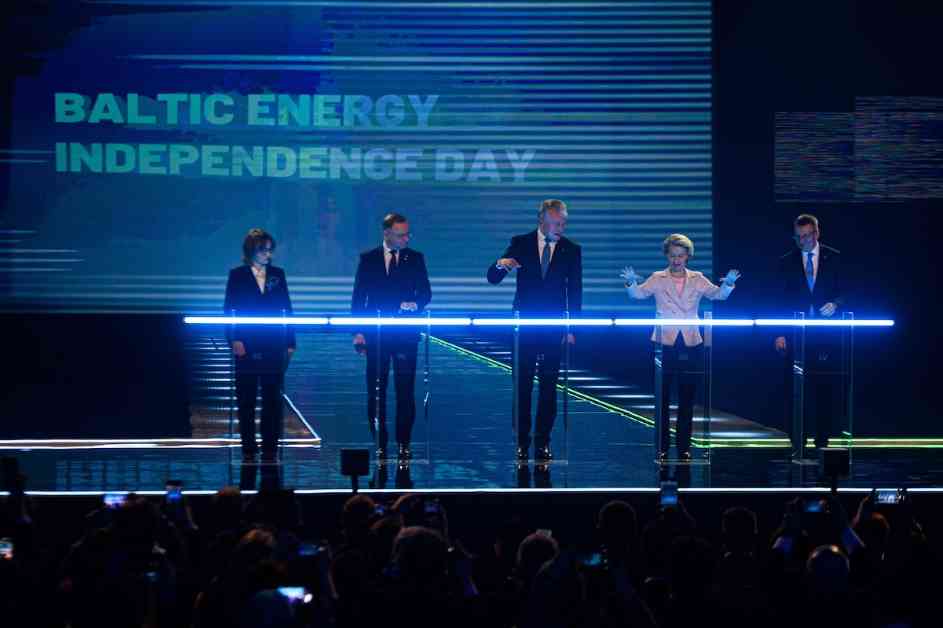In a historic move for the Baltic states of Latvia, Estonia, and Lithuania, these nations officially unplugged from Russia’s electric grid and transitioned to receiving power from the European Union’s network. The integration into the European Energy Network marked a significant step towards enhancing security and independence for the region. This strategic shift, which had been in progress since 2007, gained momentum following Russia’s invasion of Ukraine nearly three years ago.
The ceremony, dubbed ‘Baltic Energy Independence Day,’ took place in Vilnius, Lithuania, on February 9, 2025, and was attended by key figures including Lithuanian President Gitanas Nauseda, Polish President Andrzej Duda, Latvian President Edgars Rinkevics, European Commission President Ursula von der Leyen, and Estonian Minister of Climate Yoko Alender. The atmosphere was charged with anticipation and symbolism as leaders emphasized the significance of this milestone in breaking free from dependence on Russian power.
EU Chief Hails Momentous Occasion
Ursula von der Leyen, the European Commission President, described the occasion as a historic moment that signified freedom from threats and blackmail. The decision to unplug from the Russian grid, known as the Brell power grid, which encompasses Belarus, Russia, Estonia, Latvia, and Lithuania, was a critical step towards asserting control and sovereignty over their energy supply. The move was not merely symbolic but carried tangible implications for enhancing security and resilience in the region.
President Andrzej Duda of Poland echoed the sentiments, emphasizing the transition as a crucial step towards emancipation from the post-Soviet sphere of influence. As members of NATO, the Baltic countries had already ceased purchasing Russian electricity in 2022 but remained connected to Moscow through the Brell grid. The completion of the unplugging marked a significant milestone in securing their energy independence and reducing vulnerability to external pressures.
Severing Ties and Moving Forward
As the Baltic nations severed their ties with the Russian grid, workers from Latvia physically cut the electric wires near the border, symbolizing a definitive break from the past. The act was met with jubilation from the crowd, with energy minister Kaspars Melnis declaring, “We will never use it again. We are moving on.” The tangible act of disconnecting from the grid served as a powerful visual representation of their determination to chart a new course and assert their autonomy.
The careful planning and coordination involved in the disconnection process were evident, as the countries had informed both Minsk and Moscow of their intentions in advance to prevent any hostile reactions. With a shared border of 1,015 miles with Belarus and Russia, the Baltic nations took proactive measures to ensure a smooth and secure transition. The meticulous protocol laid out for disconnecting from the Russian grid underscored the meticulous planning and foresight that went into this historic move.
Margus Tsahkna, Estonia’s foreign minister, emphasized the strategic importance of ending energy dependence on Russia, highlighting that it deprived the aggressor of a potent weapon that could be wielded against them. By severing the last remaining connection to Russia, the Baltic states sent a clear message of resilience and determination to safeguard their sovereignty and security.
In conclusion, the unplugging of the Baltic states from the Russian power grid marked a significant milestone in their quest for energy independence and security. The ceremony in Vilnius, attended by key dignitaries, symbolized a bold step towards asserting control over their energy supply and reducing vulnerability to external pressures. The meticulous planning and coordination involved in the disconnection process underscored the strategic foresight and determination of the Baltic nations to secure their autonomy and resilience in the face of evolving geopolitical challenges.











